- Home
- Garth Stein
The Art of Racing in the Rain Page 2
The Art of Racing in the Rain Read online
Page 2
When he went to the bathroom, she patted my head, which hovered low to the floor. Me still being immature at just over a year old, and a little bit intimidated by all the goings-on. She said, “You don’t mind if I love him, too, do you? I won’t come between you.”
I respected her for asking, but I knew that she would come between us, and I found her denial to be untruthful.
I tried not to act off-putting because I knew how much Denny liked her. But I have to admit that I didn’t embrace her presence. And because of that, she was less than embracing of me. We were both satellites orbiting Denny’s sun, struggling for his affection. Of course, she had the advantage of her tongue and her thumbs, and when I watched her kiss and hold his hand sometimes she would glance at me and wink as if to gloat: Look at my thumbs! See what they can do!
Chapter Five
Monkeys have thumbs.
Practically the dumbest species on the planet, but monkeys have thumbs. Those monkey thumbs were meant for dogs. Give me my thumbs, you darned monkeys!
I watch too much TV. When Denny goes away in the mornings, he turns it on for me, and it’s become a habit. He warned me not to watch all day, but I do. Fortunately, he knows I love cars, so he lets me watch a lot of Speed Channel. The classic races are the best, and I especially like Formula One.
Sometimes if I’m watching the History Channel or the Discovery Channel I learn about other cultures and other ways of life. Then I start thinking about my own place in the world and what makes sense and what doesn’t.
The scientists go on and on about how monkeys are the closest evolutionary relative of people. But that’s speculation. Based on what? Based on the fact that certain ancient skulls have been found to be similar to modern man’s? What does that prove? So what if man’s body evolved from the monkeys? Whether he came from monkeys or fish is unimportant. The important idea is that when the body became “human” enough, the first human soul slipped into it.
I’ll give you a theory: Man’s closest relative is not the chimpanzee, as the TV people believe, but is, in fact, the dog.
Case-in-Point: The Werewolf
The full moon rises. The fog clings to the lowest branches of the spruce trees. The man steps out of the darkest corner of the forest and finds himself transformed into . . .
A monkey?
I think not.
Chapter Six
Her name was Eve, and at first I resented how she changed our lives. I resented the attention Denny paid to her small hands and her slender body. The way he gazed into her soft green eyes, which peered out from under stylish strands of straight blond hair. Did I envy her engaging smile? Perhaps I did. For she was a person, unlike me. She was well groomed. Unlike me. She was everything I wasn’t. I went for extended periods without a haircut or a bath, for instance; she bathed every day and had a special person do nothing else but color her hair. My nails grew too long and scratched the wood floor; she frequently attended to her nails with sticks and clippers and polishes to make sure they were the proper shape and size.
Her attention to every detail of her appearance was reflected in her personality as well. She was an incredible organizer, constantly making lists and jotting down notes of things to be done. Our weekends were filled with trips to the Home Depot or waiting in line at the Disposal and Recycling Station in Georgetown. I didn’t like painting rooms and fixing doorknobs and washing screens. But Denny liked it, apparently, because the more she gave him to do, the more quickly he completed his tasks. Then he collected his reward, which usually included a lot of nuzzling and kissing.
Soon after she moved into our apartment, they were married in a small wedding ceremony. I attended along with a group of their closest friends and Eve’s immediate family. Denny didn’t have any brothers or sisters to invite, and he explained his parents’ absence simply by saying that they didn’t travel well.
The wedding took place at a charming little beach cottage on Whidbey Island. Eve’s parents made it clear to all involved that the house was owned by close friends of theirs. I was allowed to participate only under strict rules. I was not to roam freely on the beach, as I might track sand onto the expensive mahogany floors. And I was forced to do my “business” in a very specific location next to the recycling containers.
Upon our return from Whidbey, I noticed that Eve moved through our apartment with a greater sense of ownership. She was much bolder in her actions to move or replace things: towels, linens, and even furniture. She had entered our lives and changed everything around. And yet, while I was unhappy with her intrusion, there was something about her that prevented me from being really angry with her. I believe that thing was her swollen belly.
True, I was very jealous of the attention Eve lavished on her unborn baby. But, looking back, I realize I had never given her a reason to give that same attention to me. Perhaps that is my regret. I loved how she was when she was pregnant, and yet I knew I could never be the source of her affection in that way because I could never be her child.
She devoted herself to the baby before it was even born. She touched it regularly through her tightly stretched skin. She sang to it and danced with it to music she played on the stereo. She learned to make it move around by drinking orange juice, which she did frequently. She once asked if I wanted to know what it felt like, and I did, so she held my face against her belly after she had drunk the juice, and I felt it move. It was hard for me to imagine exactly what was going on behind the magic curtain. But I knew that what was inside of her was separate from her, and had a will of its own.
I admire the female sex. The life makers. It must be amazing to have a body that can carry an entire creature inside. (I mean, other than a tapeworm, which I’ve had. That doesn’t count, really.) The life that Eve had inside her was something she had made. She and Denny had made it together. I wished, at the time, that the baby would look like me.
I remember the day the baby arrived. I had just reached adulthood—two years by calendar count. Denny was in Daytona, Florida, for the drive of his career. He had spent the entire year contacting sponsors, begging, pleading, and hustling. One day he got lucky and found the right person in the right hotel lobby to say, “You’ve got guts, son. Call me tomorrow.” Thus, he found his long-sought sponsor dollars and was able to buy a seat in a Porsche 993 for the twenty-four-hour race at Daytona.
Endurance racing is not for the meek. Four drivers each spending six hours behind the wheel of a loud, powerful race car is an exercise in determination. The 24 Hours of Daytona is as unpredictable as it is exciting. That Denny was presented with a chance to drive it in the same year that his daughter would be born was one of those coincidences that was open to interpretation. Eve was dismayed by the unfortunate timing of the events; Denny celebrated the great opportunity and the feeling that he had everything he could possibly ask for.
Still, the timing was off. On the day of the race, Eve felt the contractions and called the midwives. They came and invaded our home and quickly took charge. Later that evening, as Denny was driving at Daytona, Eve stood bent over the bed with two round ladies who helped her by holding her arms. Then, with a monstrous bellow that seemed to last an hour, out squirted a little wet blob that wriggled spastically and then cried out. The ladies helped Eve into her bed and rested the tiny purple thing on her chest until the baby’s searching mouth found Eve’s breast and began to feed.
“Could I have a minute alone—?” Eve started.
“Of course,” one of the ladies said, moving to the door.
“Come with us, puppy,” the other lady said to me on her way out.
“No”—Eve stopped them—“He can stay.”
I could stay? Despite myself, I felt proud to be included in Eve’s inner circle. The two ladies bustled off, and I watched in fascination as Eve suckled her new babe. After a few minutes, my attention drifted from the baby’s first meal to Eve’s face, and I saw that she was crying and I wondered why.
She let her free hand dangl
e to the bedside, her fingers near my muzzle. I hesitated. I didn’t want to presume she was beckoning me. But then her fingers wiggled and her eyes caught mine, and I knew she was calling me. I bumped her hand with my nose. She lifted her fingers to the crown of my head and scratched, still crying, her baby still nursing.
“I know I told him to go,” she said to me, referring to Denny. “I know that I insisted he go, I know.” Tears ran down her cheeks. “But I so wish he were here!”
I had no idea what to do, but I knew not to move. She needed me there.
“Will you promise to always protect her?” she asked.
She wasn’t asking me. She was asking Denny, and I was merely Denny’s substitute. Still, I felt the obligation. I understood that, as a dog, I could never be as connected as I truly desired. Yet, I realized at that moment, I could be something else. I could provide something of need to the people around me. I could comfort Eve when Denny was away. I could protect Eve’s baby. And while I would always want more, in a sense, I had found a place to begin.
The next day, Denny came home from Daytona, Florida, unhappy. His mood immediately changed when he held his little girl, whom they named Zoë, not after me, but after Eve’s grandmother. “Do you see my little angel, Enz?” he asked me.
Did I see her? I practically birthed her!
Denny was very careful around Eve’s parents. Maxwell and Trish had been in the house since Zoë was born, taking care of their daughter and their new baby granddaughter. I began calling them the Twins because they looked very much alike. They had the same shade of dyed hair. Plus they always wore matching outfits: khaki pants or polyester slacks with sweaters or polo shirts. When one of them wore sunglasses, the other did, too. The same with Bermuda shorts and tall socks pulled up to their knees. And because they both smelled of chemicals: plastics and hair products.
From the moment they arrived, the Twins had been criticizing Eve for having her baby at home. They told her she was endangering her baby’s welfare. And that in these modern times, it was irresponsible to give birth anywhere but in the best of all hospitals with the most expensive of all doctors. Eve tried to explain to them that statistics showed exactly the opposite was true for a healthy mother. Also, that any signs of distress would have been recognized early by her experienced team of midwives. But the Twins didn’t understand. Fortunately for Eve, Denny’s arrival home meant the Twins could turn their attention away from her faults and focus on his.
As they stood in the kitchen, Denny told Maxwell about the disappointing results of the race at Daytona. “That’s a lot of bad luck,” the male Twin said to Denny as they stood in the kitchen. Maxwell was gloating; I could hear it in his voice.
“Do you get any of your money back?” Trish asked.
Denny was very unhappy, and I wasn’t sure why until Mike came over later that night and he and Denny opened their beers together. It turned out that Denny had been going to take the third stint driving at Daytona. The car had been running well, everything going great. They were in second place and Denny would easily take the lead as the sunlight faded and the night driving began. Until the guy who had the second turn driving slammed the car into the wall on turn 6.
He crashed it when a Daytona Prototype—a much faster car—was overtaking. First rule of racing: Never move aside to let someone pass; make him pass you. But the driver on Denny’s team moved over, and he hit a bad patch on the track. When he did, the rear end snapped around and he plowed into the wall at pretty close to top speed. The car shattered into a million little pieces.
The driver was unhurt, but the race was over for the team. And Denny, who had spent a year working for this moment, found himself standing by the side of the racetrack watching the opportunity of his lifetime get dragged away by a tow truck. He hadn’t had a chance to sit in it for a single racing lap.
“And you don’t get any of your money back,” Mike said, after Denny had finished telling his story.
“I don’t care about any of that,” Denny said. “I should have been here.”
“The baby came early. You can’t know what’s going to happen before it happens.”
“Yes, I can,” Denny said. “If I’m any good, I can.”
“Anyway,” Mike said, lifting his beer bottle, “to Zoë.”
“To Zoë,” Denny echoed.
To Zoë, I said to myself. Whom I will always protect.
Chapter Seven
When it was just Denny and me, he used to make up to ten thousand dollars a month in his spare time by selling things to people over the telephone. But after Eve became pregnant, Denny took his job behind the counter at the fancy auto shop. The one that serviced only expensive German cars. Denny liked his job, but it ate up all of his free time, and he and I didn’t get to spend our days together anymore.
Sometimes on weekends, Denny taught at a high-performance drivers’ school run by one of the many car clubs in the area—BMW, Porsche, Alfa Romeo. He often took me to the track with him. I enjoyed these outings very much. He didn’t really like teaching at these events because he didn’t get to drive; he just had to sit in the passenger seat and tell other people how to drive. He fantasized about moving somewhere—to Sonoma or Phoenix, or even Europe—and catching on with one of the big schools so he could drive more. Eve said she didn’t think she could ever leave Seattle.
Eve worked for some big clothing company because it provided us with money and health insurance. Also because she could buy clothes for the family at the employee discount. She went back to work a few months after Zoë was born, even though she really wanted to stay home with her baby.
With Denny and Eve working and Zoë off at day care, I was left to my own devices. For most of the dreary days I was alone in the apartment, wandering from room to room, from nap spot to nap spot. I spent a lot of time doing nothing more than staring out the window. I hadn’t realized how much I enjoyed having everyone bustling around the house for those first few months of Zoë’s life. I had felt so much a part of something. I played a role in Zoë’s entertainment.
Sometimes after a feeding, when she was awake and alert and strapped safely into her bouncy seat, Eve and Denny would play Monkey in the Middle. They would throw a ball of socks back and forth across the living room; I got to be the monkey. I leapt after the socks and then scrambled back to catch them. Then I danced like a four-legged clown to catch them again. And when I reached the sock ball and batted it into the air with my snout, Zoë would squeal and laugh; she would shake her legs with such force that the bouncy chair would scoot along the floor. And Eve, Denny, and I would collapse in a pile of laughter.
But then everyone moved on and left me behind.
I sank into the emptiness of my lonely days. I would stare out the window and try to picture what it was like before everyone went away, how much fun we all had together. But it didn’t help much. Until one day when a fortunate accident happened that changed my life. Denny turned on the TV in the morning to check the weather report, and he forgot to turn the TV off.
Let me tell you this: The Weather Channel is not about weather; it is about the world! It is about how weather affects us all, our entire global economy. Also our health, happiness, and spirit. The channel goes into great detail about weather of all different kinds—hurricanes, tornadoes, hail, rain, lightning storms. Absolutely fascinating. So much so that when Denny returned from work that evening, I was still glued to the television.
“What are you watching?” he asked when he came in, as if I were Eve or Zoë. As if it couldn’t have been more natural to see me there or address me like that. But Eve was in the kitchen cooking dinner and Zoë was with her; it was just me. I looked at him and then back to the TV, which was showing the day’s major event: flooding due to heavy rainstorms on the East Coast.
“The Weather Channel?” he scoffed, snatching up the remote and changing the channel. “Here.”
He changed it to Speed Channel.
I had watched plenty of TV as I grew up,
but only when a person was already watching: Denny and I enjoyed racing and the movie channels. Eve and I watched music videos and Hollywood gossip. Zoë and I watched children’s shows. (I tried to teach myself to read by studying Sesame Street, but it didn’t work.) Suddenly, the idea of watching television by myself entered my life! If I had been a cartoon, the lightbulb over my head would have lit up. I barked excitedly when I saw cars racing on the screen. Denny laughed.
“Better, right?”
Yes! Better! I stretched deeply, joyously, doing my best downward-facing dog and wagging my tail—both gestures of happiness and approval. And Denny got it.
“I didn’t know you were a television dog,” he said. “I can leave it on for you during the day, if you want.”
I want! I want!
“But you have to limit yourself,” he said. “I don’t want to catch you watching TV all day long. I’m counting on you to be responsible.”
I am responsible!
I had learned a great deal up until that point in my life. But once Denny began leaving the TV on for me, my education really took off. With the boredom gone, time started moving quickly again. The weekends, when we were all together, seemed short and filled with activity. And while Sunday nights were bittersweet, I took great comfort in knowing I had a week of television ahead.
I was so immersed in my education, I suppose I lost count of the weeks. So I was surprised by the arrival of Zoë’s second birthday. Suddenly I was engulfed by a party in the apartment with a bunch of little kids. It was loud and crazy, and all the children let me play with them and wrestle on the rug. I even let them dress me up with a hat and a sweat jacket, and Zoë called me her big brother. They got lemon cake all over the floor, and I got to be Eve’s helper cleaning it up while Denny opened presents with the kids. She used a Dustbuster and I used my tongue.

 A Sudden Light
A Sudden Light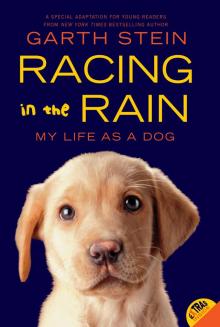 The Art of Racing in the Rain
The Art of Racing in the Rain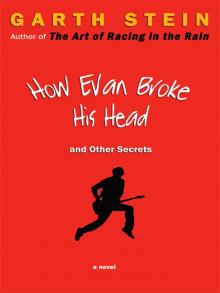 How Evan Broke His Head and Other Secrets
How Evan Broke His Head and Other Secrets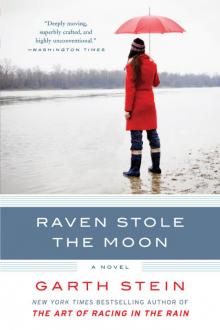 Raven Stole the Moon
Raven Stole the Moon A Sudden Light: A Novel
A Sudden Light: A Novel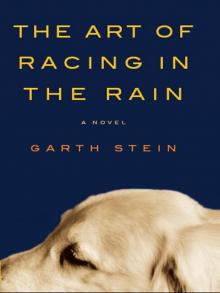 Art of Racing in the Rain, The
Art of Racing in the Rain, The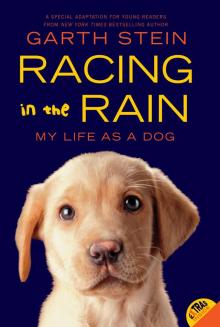 Racing in the Rain
Racing in the Rain